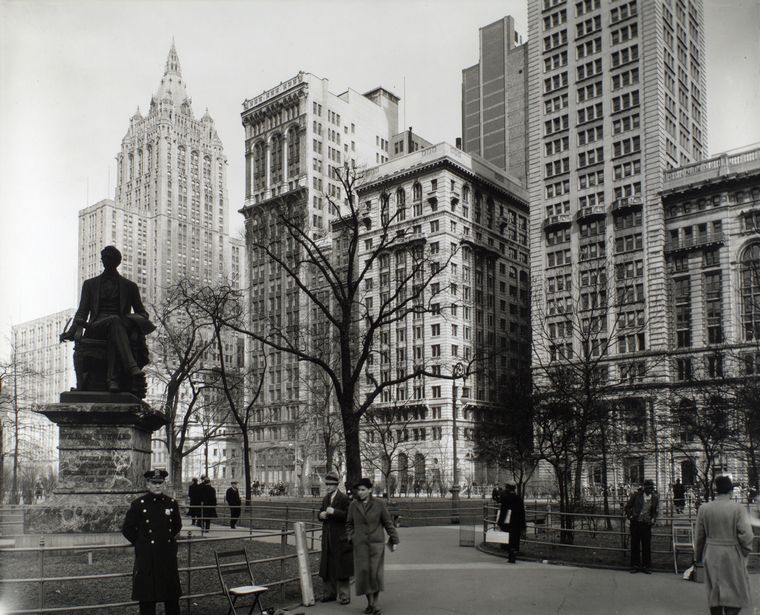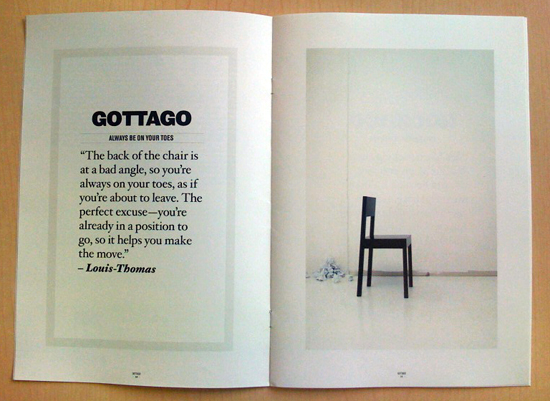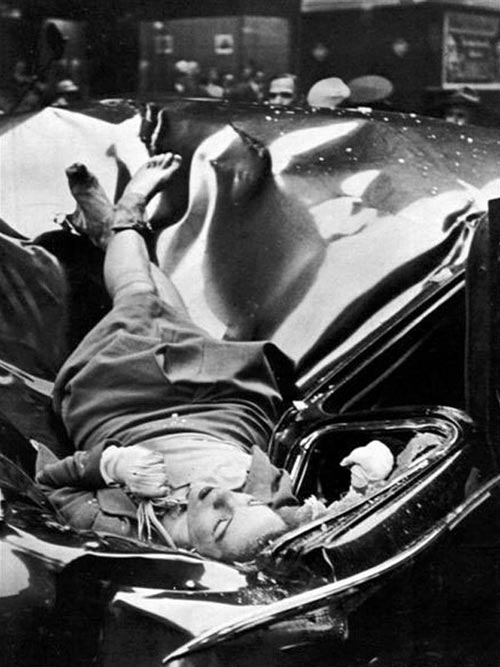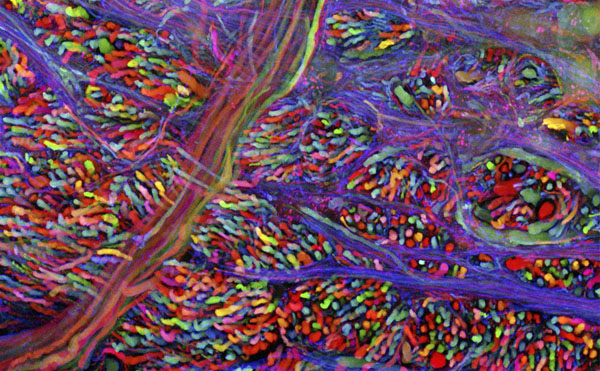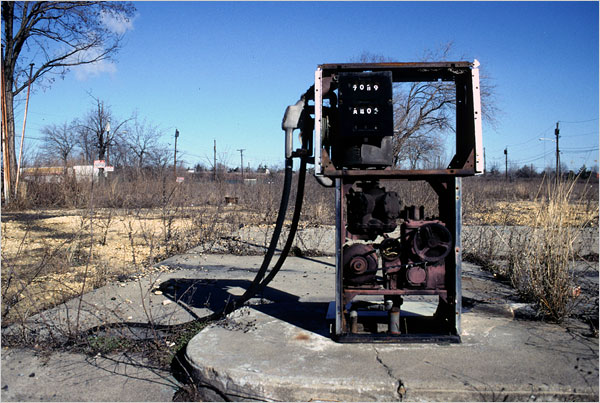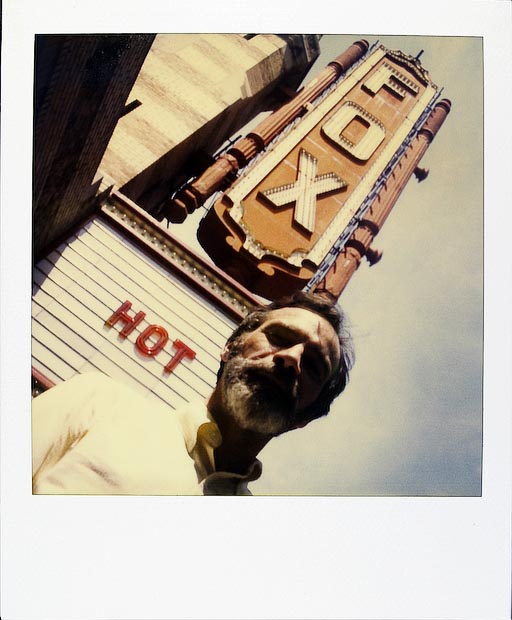Things tagged art:
Point and Shoot: 1925
Washington, D.C., circa 1925. “Girls’ rifle team of Drexel Institute.” National Photo Company Collection glass negative.
Click through for original size un-cropped.
Via Daring Fireball.
Weapons of Mass Destruction
“Little Boy” (Hiroshima Atomic Bomb) 1945
Nice set of black and white (and infrared?) photos of cold war era Weapons of Mass Destruction.
See also: “Atomic John” in The New Yorker
The single, blinding release of pure energy over Hiroshima, Japan, on August 6, 1945, marked a startling and permanent break with our prior understandings of the visible world. Yet for more than sixty years the technology behind the explosion has remained a state secret.
The most accurate account of the bomb’s inner workings—an unnervingly detailed reconstruction, based on old photographs and documents—has been written by a sixty-one-year-old truck driver from Waukesha, Wisconsin, named John Coster-Mullen, who was once a commercial photographer, and has never received a college degree.
Run Lola Run Lola Run Lola Run Lola Run
Run Lola Run Lola Run Lola Run Lola Run from shiffman on Vimeo.
Via kottke.org.
Changing New York
Included in the NYPL’s recent addition to the Flickr Commons project is Changing New York, a selection of photos taken of NYC in the 1930s by Berenice Abbott as part of a government program for unemployed artists.
Via kottke.org.
Fleeting Seating: The Slightly Uncomfortable Chair Collection
“I remember when I was a kid,” Pelletier explains in the text within the brochure, “there was a rumour – I don’t know if it was true - that at McDonalds, the benches were made so that you wouldn’t spend too much time there.” It was from that thought the idea for the Slightly Uncomfortable Chair Collection (SUCC) came.
Via kottke.org.
Deformation
Robert C. Wiles, 1947
On May Day, just after leaving her fiancé, 23-year-old Evelyn McHale wrote a note. 'He is much better off without me ... I wouldn't make a good wife for anybody,' ... Then she crossed it out. She went to the observation platform of the Empire State Building. Through the mist she gazed at the street, 86 floors below. Then she jumped. In her desperate determination she leaped clear of the setbacks and hit a United Nations limousine parked at the curb. Across the street photography student Robert Wiles heard an explosive crash. Just four minutes after Evelyn McHale's death Wiles got this picture of death's violence and its composure.
Via Super Colossal.
See also Crashing to Earth, Again and Again
Peering into the micro world
In this Harvard University photograph released October 8th, 2008, brain cells of a laboratory mouse are shown glowing with multicolor fluorescent proteins at Harvard University in Cambridge, Mass. The Nobel prize in chemistry was awarded to two Americans and a U.S.-based Japanese scientist for research on a glowing jellyfish protein that revolutionized the ability to study disease and normal development in living organisms. (AP Photo/Harvard University, Livett-Weissman-Sanes-Lichtman)
Posted at The Big Picture.
Scenes from Antarctica
Down in Antarctica, November marks the end of spring, the beginning of austral summer, and the beginning of Antarctica’s cruise season. The Sun just rose for the first time in 6 months on September 22nd, and is now visible in the sky all the time. Recent studies in Antarctica have brought new insights into the origins of deep sea octopus species (a 30 million-year-old ancestor from Antarctic waters), volcanic contributions to disappearing antarctic ice, and the effects of increasing numbers of icebergs scouring the seafloor. Collected here are 32 photographs of Antarctica from the past several years.
Posted at The Big Picture.
Sha Na Na and the Invention of the Fifties
Contemporary scholars of American cultural history have begun writing that Sha Na Na’s greatest achievement was the invention of a new American era: the “Fifties.” The whole notion of how artists can change the way a historical era is viewed, and relatively quickly, is interesting on its own.
Via Arts & Letters Daily.
The Mother of All Maker Zen Clips
Bruce Sterling at Beyond the Beyond:
*This French guy is serenely hand-manufacturing his own vacuum tubes.
*This video is seventeen minutes long. I’d also be guessing this gentleman has invested about seventeen years in acquiring that vacuum-tube zen.
Top 15 Criteria That Define Interactive or New Media Art
The Near Future Laboratory Top-15 Criteria for New or Interactive Media Art are…15. It doesn’t work
14. It doesn’t work because you couldn’t get a hold of a 220-to-110 volt converter/110-to-220 volt converter/PAL-to-NTSC/NTSC-to-PAL scan converter/serial-to-usb adapter/“dongle” of any sort..and the town you’re in is simply not the kind of place that has/cares about such things
13. Your audience looks under/behind your table/pedestal/false wall/drop ceiling or follows wires to find out “where the camera is”
12. Someone either on their blog or across the room is prattling on about the shifting relations between producers and consumers..and mentions your project
11. Your audience “interacts” by clapping/hooting/making bird calls/flapping their arms like a duck or waving their arms wildly while standing in front of a wall onto which is projected squiggly lines
10. Your audience asks amongst themselves, “how does it work?”
9. The exhibition curators insist that you spend hours standing by your own wall text so that you can explain to attendees “how it works”
8. It’s just like using your own normal, human, perfectly good eyeballs, only the resolution sucks and the colors are really lousy..plus the heat from the CPU fan is blowing on your forehead which makes you really uncomfortable and schvitz-y
7. Someone in your audience wearing a Crumpler bag, slinging a fancy digital SLR and/or standing with their arms folded smugly says, “Yeah..yeah, I could’ve done that too..c’mon dude..some Perlin Noise? And Processing/Ruby-on-Rails/AJAX/Blue LEDs/MaxMSP/An Infrared Camera/Lots of Free Time/etc.? Pfft..It’s so easy…”
6. Someone in your audience, maybe the same guy with the Crumpler bag and digital SLR excitedly says, “Oh, dude. That should totally be a Facebook app!”
5. It’s called a “project” and not a “piece of art”
4. You saw the “project” years ago…and here it is again…now with multi-touch interaction and other fancy digital bells and Web 2.0-y whistles
3. Your audience cups their hands over various proturbances/orifices at or nearby your project attempting to confuse/interact with the camera/sensor/laser beam, even if it uses no such technology
2. There’s a noticeable preponderance of smoothly shifting red, green and blue lighting effects
1. People wonder if it wasn’t all really done in Photoshop, anyway
Via Bruce Sterling at Beyond the Beyond.
Out of Gas
A collection of photos of old gas stations from Camilo José Vergara’s amazing Invincible Cities project, which if you haven’t seen, you need to check out.
Polaroid of the Day
Via the previous item on Polaroids, I found this:
When Jamie Livingston, photographer, filmmaker, circus performer, accordian player, Mets fan, and above all, loyal friend, died on October 25th (his birthday) in 1997 at the age of 41, he left behind hundreds of bereft friends and a collection of 6,000 photographs neatly organized in small suitcases and wooden fruit crates.
Jamie took a polaroid once a day, every day, including his last, for 18 years.
This photographic diary, which he called, "Polaroid of the Day," or P.O.D., began when Jaime was a student at Bard College in Annandale-on-Hudson. The project continued when he moved to apartments in New York City including the incredible circus memorabilia-filled loft on Fulton Street, which he shared with his best friend. That loft was the site of many a Glug party, an "orphans thanksgiving," a super-8 festival of Jamie's lyrical Super-8 films, and a rollicking music jam.
Info here and the complete collection of photos is here.
Via Jason Santa Maria.
Shake It Like a Metaphorical Picture
Sometime next year, Polaroid will stop producing instant film. There have been lots of people jumping in to help save the format, and others writing some striking eulogies, as the rest of us start mourning the oncoming loss. But one thing I can’t quite shake is what Polaroid represents to me, something that will likely be on its way out the door too: the visual metaphor of a photograph.
Via Gruber at Daring Fireball.
Food that takes the shape of its container
one in a series of food that takes the shape of its container
Via Marcus Trimble at Super Colossal.
Give Us Today Our Daily Terror
Exact copy of Hitchcock’s 1963 film The Birds from which all birds have been removed
Single channel video, color, 119 minutes
Via Marcus Trimble at Super Colossal.


